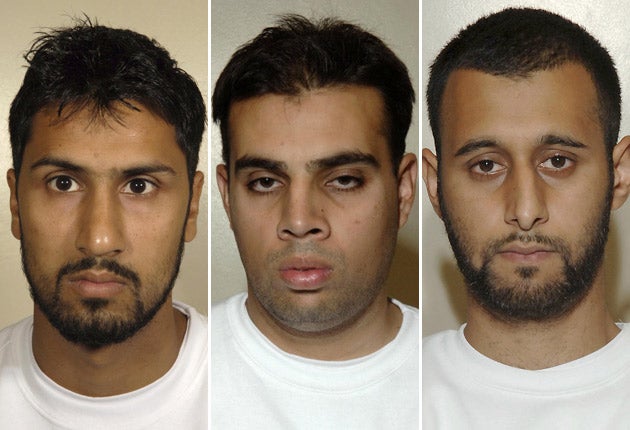Airline bombs trio given life sentences for 'wicked' plot

Three British terrorists were jailed for life today for plotting to murder thousands of passengers on transatlantic flights in an atrocity which would have compared to the September 11 attacks.
The airline bomb plot was "the most grave and wicked conspiracy ever proven within this jurisdiction", the judge Mr Justice Henriques said.
The members of the al Qaida-inspired terror cell planned to detonate home-made liquid bombs on flights bound for major North American cities.
They were told they remain a serious danger to the public and may never be released.
Mr Justice Henriques said ringleader Abdulla Ahmed Ali must serve a minimum of 40 years in prison and was a "driven and determined extremist with boundless energy and an ambition to lead a terrorist outrage of massive proportions".
Accomplices Assad Sarwar and Tanvir Hussain were also given life sentences as they were jailed for a minimum of 36 and 32 years respectively.
Ali, 28, of Walthamstow, east London, was found guilty along with Sarwar and Hussain last week at Woolwich Crown Court of conspiracy to murder on an airliner following the largest-ever counter-terrorism operation in the UK.
"The intention was to perpetrate a terrorist outrage that would stand alongside the events of September 11, 2001 in history," Mr Justice Henriques said.
He told Ali: "By this conspiracy you sought the attention of the world, and you now have it."
Ali was "producer, director, cameraman, part-author and actor in six martyrdom tapes" which warned the British public to expect "floods of martyr operations" that would leave body parts scattered in the streets, the judge said.
"You made it as clear as can be that innocent people were going to die - men, women and children.
"You have embraced Islamic extremism and it is that burning extremism that has motivated you throughout this conspiracy and is likely to drive you again."
Mr Justice Henriques said it was clear Ali was "intelligent" and that he had "argued the unarguable over many days" with prosecutors and "sought to justify the mass killing" in the gang's suicide videos.
"This was a viable and meticulously planned conspiracy and I conclude it was imminent," the judge said.
He said the plot was not an attempt by Ali to change the Government's foreign policy, but "an act of revenge inspired by extremist Islamic thinking" and aimed at the "governments of several allied forces in Iraq and Afghanistan".
"The extent of harm would have been unprecedented," he said.
"Tons of liquids are confiscated from the public on a daily basis at major airports.
"These security arrangements have involved massive expenditure by governments and airport authorities and huge inconvenience to the travelling public.
"The number of hours standing in airport queues, many by hard-working individuals, is incalculable and entirely attributable to this conspiracy."
The judge said the emails at the centre of the retrial - which were unavailable to prosecutors in the first trial last year - "are a vital source of information as to the control, progress and scope of this conspiracy".
"They establish beyond question the ultimate control of this conspiracy lay in Pakistan."
While others in Pakistan controlled, monitored and funded the plot, Ali, Sarwar, 29, from High Wycombe, Bucks, and Hussain, 28, from Leyton, east London, were "high-level executives within this country", the judge added.
He said the airline bomb plot had "reached an advanced stage in its development".
The men had "sufficient chemicals for 20 home-made detonators of commercial strength".
"I'm satisfied that there is every likelihood that this plot would have succeeded but for the intervention of the police and the security service," he said.
Referring to a video of a mock explosion on board an airliner, Mr Justice Henriques said: "I could only conclude the chance of an aircraft surviving such an explosion at altitude was remote.
"Had this conspiracy not been interrupted, a massive loss of life would almost certainly have resulted - and if the detonation was over land, the number of victims would have been even greater still."
Earlier, Nadine Radford QC, defending Ali, said the airline bomb plot was "not viable" and "certainly had not left the drawing board".
There was no test explosion and no dummy run, she said.
In front of a packed public gallery, a casually dressed Ali read a small book as he was sentenced.
The judge told Sarwar he was a "vital and leading member of this conspiracy", who had trained in Pakistan, embraced Islamic extremism, and acted as the "chemist and quartermaster" for the operation.
Sarwar also researched other potential targets, including the Bacton oil refinery, nuclear power stations and gas pipe lines.
The judge told Hussain his role was "substantial, albeit inferior to both Ali and Sarwar" and that his involvement was "entirely attributable to long-term loyalty to Ali".
The judge also excused the jurors from serving again for 10 years, saying: "You have by any standards been an exceptional jury.".
The nine women and three men failed to reach a verdict on a fourth man, Umar Islam, in connection with the airliner plot last week.
Prosecutors are not seeking a retrial and the charge will be left to lie on file.
But Islam, 31, of Plaistow, east London, was convicted of conspiracy to murder and was sentenced to life with a minimum of 22 years today.
